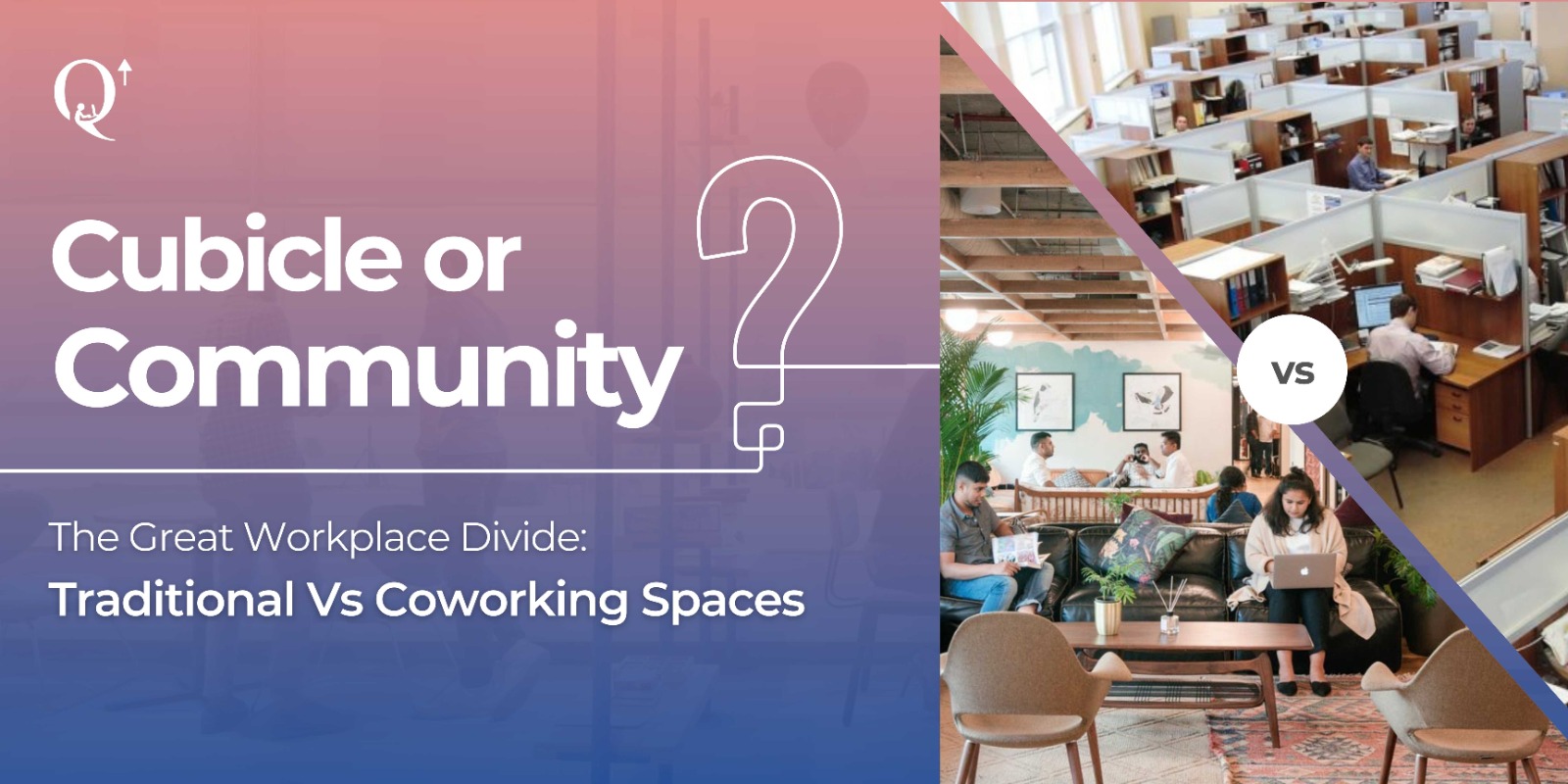Gone are the days of rigid 9-to-5 schedules and cubicle farms. The way we work has undergone a seismic shift in recent years. Today, professionals increasingly embrace flexible work arrangements, with coworking spaces emerging as a popular alternative to traditional offices. But which option is right for you?
Defining Workspaces: Traditional vs. Coworking
Traditional Workspaces: The Cornerstone of Structure For decades, the traditional workspace has been the dominant paradigm. Characterized by its structured layout and familiar features, it has served as the backdrop for countless careers and innovations.
Coworking Spaces: In contrast to the traditional model, coworking spaces offer a shared and dynamic work environment. These spaces are designed to foster collaboration, networking, and a sense of community among professionals from diverse backgrounds and industries.
Coworking spaces offer shared workspaces for individuals and businesses, fostering a vibrant community atmosphere. Here are some key advantages for various demographics:
- Women in the Workforce: Coworking spaces provide a safe and supportive environment for female entrepreneurs and professionals. Many women struggle to strike a work-life balance, and flexible working hours offered by such coworking spaces are incredibly beneficial as they reduce the barrier to entry in commercial industries, which are often male-dominated, to begin with.
- Student-Professionals: Juggling education and work can be challenging. Coworking spaces offer dedicated workspaces tailored to meet the needs of an individual or a team, coworking spaces can be rented out by the day, week, or month too, making it cost-efficient for student-professionals. With their endless amenities and often serviced spaces, young professionals with a go-getter mindset need not worry about setting up before diving headfirst into their work at any time of the day with the help of flexible working hours.
- Solopreneurs: Setting up and maintaining a traditional office can be daunting for solopreneurs. Coworking spaces offer a cost-effective solution, providing access to essential amenities like high-speed internet, printing facilities, and meeting rooms.
- Small Businesses: Small businesses are flourishing in India, and coworking spaces are perfect to facilitate this. Startups and small businesses can benefit from the scalability and flexibility of coworking spaces. They can easily adjust their workspace needs as their team grows, avoiding the long-term commitments of traditional leases.
Beyond Demographics:
The benefits of coworking extend far beyond specific groups:
- Flexibility: Coworking spaces offer flexible work hours and diverse workspace options, from hot desks to private offices. This caters to individual preferences and work styles, promoting productivity and well-being.
- Networking and Collaboration: The shared environment fosters connections and collaboration between professionals from different industries. This can lead to new ideas, partnerships, and business opportunities.
- Cost-Effectiveness: Compared to traditional offices, coworking spaces offer significant cost savings. Users only pay for their space, eliminating overhead expenses like rent, utilities, and furniture.
- Community: Coworking spaces often host events and workshops, creating a sense of community and belonging. This can particularly benefit remote workers or those who crave social interaction.
A Vibrant Tapestry: Diversity in the Workplace
One of the most significant advantages of coworking spaces is their inherent diversity. These spaces unite individuals from all walks of life, creating a vibrant tapestry of age, socioeconomic background, ethnicity, and more. This diversity offers a wealth of benefits for both individuals and businesses:
- Exposure to Different Perspectives: Coworking spaces expose members to various ideas, experiences, and viewpoints. This can spark creativity, innovation, and problem-solving, leading to better outcomes for individuals and teams.
- Enhanced Creativity and Problem-Solving: By working alongside people from diverse backgrounds, individuals are challenged to think outside the box and consider new approaches to problems. This cross-pollination of ideas can lead to more creative and effective solutions.
- Stronger Networks and Collaboration: The diverse community in coworking spaces fosters collaboration and networking opportunities. Individuals can connect with like-minded professionals, find potential collaborators, and build valuable relationships that can benefit their careers and businesses.
- Fostering Inclusion: Coworking spaces can play a crucial role in breaking down barriers and promoting inclusion in the workplace. By providing a welcoming and inclusive environment for people from all backgrounds, these spaces can create a more equitable and diverse professional landscape.
Here are some examples of Diversity in Coworking Spaces:
- Age Diversity: Coworking spaces attract individuals of all ages, from young entrepreneurs to seasoned professionals. This age diversity can lead to a richer exchange of ideas and experiences, as younger members can benefit from the experience of their older colleagues. In contrast, older members can help foster newer ideas the younger professionals have and stay connected to the latest tech updates in the workspace.
- Socioeconomic Diversity: Coworking spaces offer affordable workspace options, making them accessible to individuals from diverse socioeconomic backgrounds. This can help to level the playing field and create opportunities for people who may not have been able to afford traditional office space.
- Ethnic Diversity: Coworking spaces bring together people from different ethnicities and cultures. This cultural diversity can foster a deeper understanding and appreciation of different perspectives, leading to a more inclusive and respectful work environment.
- Gender Diversity: Coworking spaces are often considered more gender-inclusive than traditional workplaces. This can be especially beneficial for women entrepreneurs and professionals, who may find it easier to network and build relationships in a coworking environment.
While the traditional workspace may not be the perfect fit for everyone, it remains a valuable option for businesses and individuals seeking stability, structure, and control. As the world of work continues to evolve, traditional workspaces will likely adapt and incorporate elements of flexibility and collaboration to remain relevant in the years to come. Although coworking spaces offer numerous advantages, traditional offices still hold their own:
- Privacy and Control: Traditional offices provide dedicated workspaces, ensuring privacy and control over the work environment. This can be crucial for businesses dealing with confidential information or requiring focused work.
- Structured Layout: The workspace organisation, often dictated by cubicles or walls, establishes clear boundaries and promotes a sense of order. This can be helpful for teams that thrive on routine and predictability.
- Brand Identity: A traditional office allows businesses to create and project their brand identity through design and layout. This can be important for fostering team spirit and attracting clients.
- Stability and Predictability: Long-term leases in traditional offices offer stability and predictability, benefiting businesses with established teams and workflows.
- Direct Management: Companies with traditional offices have more direct control over the physical work environment and amenities, allowing them to tailor it to their needs.
The Verdict: It’s All About Choice
Ultimately, the best choice between coworking spaces and traditional offices depends on your individual needs and preferences. Consider factors like your work style, budget, team size, and desired level of flexibility and community. Remember, the future of work is not a one-size-fits-all model. By understanding the pros and cons of both coworking and traditional offices, you can make an informed decision that empowers you to thrive in today’s dynamic work environment.
Suppose you think coworking spaces are the way to go for you and are looking for workspaces in cities such as Gurgaon, Delhi, Bangalore, Pune, Indore and Jaipur, amongst others. In that case, Qdesq meets all your needs with hundreds of listings on our website – find serviced office spaces, virtual offices, meeting rooms, private offices, coworking spaces and training rooms tailored perfectly to your needs!
Read more:










